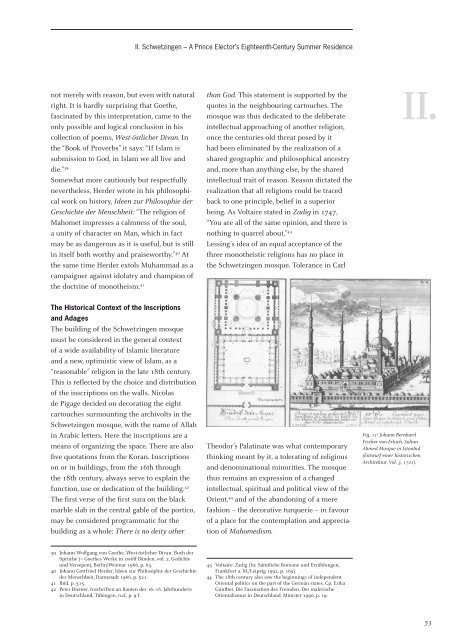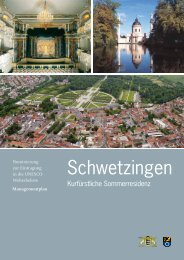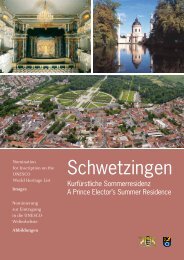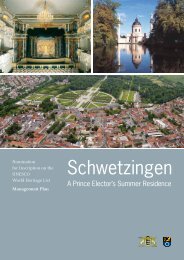II. - Schloss Schwetzingen
II. - Schloss Schwetzingen
II. - Schloss Schwetzingen
Create successful ePaper yourself
Turn your PDF publications into a flip-book with our unique Google optimized e-Paper software.
not merely with reason, but even with natural<br />
right. It is hardly surprising that Goethe,<br />
fascinated by this interpretation, came to the<br />
only possible and logical conclusion in his<br />
collection of poems, West-östlicher Divan. In<br />
the “Book of Proverbs” it says: “If Islam is<br />
submission to God, in Islam we all live and<br />
die.” 39<br />
Somewhat more cautiously but respectfully<br />
nevertheless, Herder wrote in his philosophical<br />
work on history, Ideen zur Philosophie der<br />
Geschichte der Menschheit: “The religion of<br />
Mahomet impresses a calmness of the soul,<br />
a unity of character on Man, which in fact<br />
may be as dangerous as it is useful, but is still<br />
in itself both worthy and praiseworthy.” 40 At<br />
the same time Herder extols Muhammad as a<br />
campaigner against idolatry and champion of<br />
the doctrine of monotheism. 41<br />
The Historical Context of the Inscriptions<br />
and Adages<br />
The building of the <strong>Schwetzingen</strong> mosque<br />
must be considered in the general context<br />
of a wide availability of Islamic literature<br />
and a new, optimistic view of Islam, as a<br />
“reasonable” religion in the late 18th century.<br />
This is refl ected by the choice and distribution<br />
of the inscriptions on the walls. Nicolas<br />
de Pigage decided on decorating the eight<br />
cartouches surmounting the archivolts in the<br />
<strong>Schwetzingen</strong> mosque, with the name of Allah<br />
in Arabic letters. Here the inscriptions are a<br />
means of organizing the space. There are also<br />
fi ve quotations from the Koran. Inscriptions<br />
on or in buildings, from the 16th through<br />
the 18th century, always serve to explain the<br />
function, use or dedication of the building. 42<br />
The fi rst verse of the fi rst sura on the black<br />
marble slab in the central gable of the portico,<br />
may be considered programmatic for the<br />
building as a whole: There is no deity other<br />
39 Johann Wolfgang von Goethe, West-östlicher Divan. Buch der<br />
Sprüche (= Goethes Werke in zwölf Bänden, vol. 2, Gedichte<br />
und Versepen), Berlin/Weimar 1966, p. 63.<br />
40 Johann Gottfried Herder, Ideen zur Philosophie der Geschichte<br />
der Menschheit, Darmstadt 1966, p. 521.<br />
41 Ibid. p. 515.<br />
42 Peter Diemer, Inschriften an Bauten des 16.-18. Jahrhunderts<br />
in Deutschland, Tübingen, n.d., p. 9 f.<br />
<strong>II</strong>. <strong>Schwetzingen</strong> – A Prince Elector’s Eighteenth-Century Summer Residence<br />
than God. This statement is supported by the<br />
quotes in the neighbouring cartouches. The<br />
mosque was thus dedicated to the deliberate<br />
intellectual approaching of another religion,<br />
once the centuries-old threat posed by it<br />
had been eliminated by the realization of a<br />
shared geographic and philosophical ancestry<br />
and, more than anything else, by the shared<br />
intellectual trait of reason. Reason dictated the<br />
realization that all religions could be traced<br />
back to one principle, belief in a superior<br />
being. As Voltaire stated in Zadig in 1747,<br />
“You are all of the same opinion, and there is<br />
nothing to quarrel about.” 43<br />
Lessing’s idea of an equal acceptance of the<br />
three monotheistic religions has no place in<br />
the <strong>Schwetzingen</strong> mosque. Tolerance in Carl<br />
Theodor’s Palatinate was what contemporary<br />
thinking meant by it, a tolerating of religious<br />
and denominational minorities. The mosque<br />
thus remains an expression of a changed<br />
intellectual, spiritual and political view of the<br />
Orient, 44 and of the abandoning of a mere<br />
fashion – the decorative turquerie – in favour<br />
of a place for the contemplation and appreciation<br />
of Mahomedism.<br />
43 Voltaire: Zadig (In: Sämtliche Romane und Erzählungen,<br />
Frankfurt a. M./Leipzig 1992, p. 169).<br />
44 The 18th century also saw the beginnings of independent<br />
Oriental politics on the part of the German states. Cp. Erika<br />
Günther, Die Faszination des Fremden. Der malerische<br />
Orientalismus in Deutschland, Münster 1990, p. 19.<br />
<strong>II</strong>.<br />
Fig. 11: Johann Bernhard<br />
Fischer von Erlach, Sultan<br />
Ahmed Mosque in Istanbul<br />
(Entwurf einer historischen<br />
Architektur, Vol. 3, 1721).<br />
53






